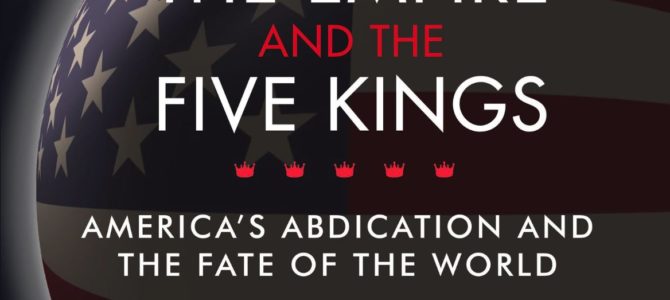
In the tiny kingdom of Francophone Americanophiles, Bernard-Henri Levy reigns supreme.
More or less unique among his countrymen, the French philosopher, journalist, and activist favors the United States and Europe vigorously vindicating human rights and advocating for freedom, including through the use of force, around the globe. In The Empire and the Five Kings: America’s Abdication and the Fate of the World, a characteristically trenchant and poignant polemic that is part cri-de-coeur, part battle cry, Levy urges Western leaders and their populations to restore their once unquestioned commitment to global leadership, especially as darker forces gather strength.
The empire represents the United States, while the five kings signify Iran, Turkey, Saudi Arabia, Russia, and China — aggressive, autocratic powers jockeying for regional and even global hegemony.
The United States, Levy argues, “lacks something of that splendor, that self-confidence, that hubris that characterized, for example, the absolute power of seventeenth-century France or Renaissance Italy. It lacks, and will long lack, the imprimatur, the scar, of total authority.”
Still, he gratefully acknowledges the American spirit of responsibility that motivated our entries into World War I and II alike, “a belief in the exceptional role of an American nation called upon to pick up the torch that had fallen from the fragile hands of the prophets and apostles of the City of God; and the mission was to carry that torch into dark lands.”
Retrenchment from Five Kings
Levy traces the recent Western retrenchment from global engagement to several causes. First, he has no love lost for President Trump, whom he says has recklessly antagonized our European allies for no good reason, but he aptly notes that Trump’s predecessor — responsible for a “pivot to Asia,” a Russian reset, and absent from the 25th anniversary celebration of the fall of the Berlin Wall — set an almost equally poor example.
He also contends that our focus and energy have turned unduly to the “panopticon” of technological surveillance, to “global domination through GAFA — Google, Amazon, Facebook, Apple.” These “empires within the empire” have, in Levy’s telling, impoverished discourse, strained relationships, derailed democracy, and defeated objective truth itself. Levy goes so far as to bundle together Trump and Mark Zuckerberg as “two blades of a pair of scissors that is cutting the fabric of truth to ribbons.”
Into the void, he says, have stepped Ayatollah Khamenei, Vladimir Putin, Recep Tayyip Erdogan, Xi Jinping, and Muhammad bin Sultan, each aggressive and problematic in his own way, and each determined to erode the post-Cold War order which America still, barely, dominates.
Collectively, these kings actively strive to unwind Western hegemony, whether thru the One Belt, One Road initiative, nuclear enrichment, force projection into the Ukraine and the Middle East, suppression of internal dissent, or intervention in Syria and oppression of the Kurds. The latter group are a “great people who have paid for their determination to endure with a mountain of suffering rare in human history” that hold an important place in Levy’s heart.
These kings appear, in Levy’s telling, to be motivated by “a clear, self-effacing, and thoroughly resigned awareness of the fact that the greatness of those empires, their incontestable munificence, the authority they exercised over the world, did not stop them from being destroyed and disappearing from the face of the earth.”
But Levy is largely optimistic that today’s five kings will gradually meet their demise, as they are economically and politically weak, not well suited to dominate the globe, and ill-equipped to inspire the spread any sort of serious political or economic ideas to other countries. If the United States (as well as Europe) avoid the temptation to succumb to nihilism and discouragement, we can ensure the tyrants do not prevail.
Resuming America’s Central Place
Perhaps the most interesting and unique chapter of Empire is Levy’s discursion on two biblical stories, each involving five kings. In the first, Abraham aligns with five wicked kings of the ancient Near East, each of whose name connotes a different type of evil, against an overweening empire bent on their destruction, a sort of protean Iran-Iraq War where, to quote Kissinger, it was a pity they both couldn’t lose.
So why did Abraham leap to the defense of these kings, who included the tyrants who ruled over Sodom and Gomorrah? While the text itself is largely silent, Levy reckons that Abraham recognized the possibility of redemption and freedom for the subjects of these kings and sought their liberation. He likens the Abrahamic rescue mission to the crucial need to support “the Arab reformers, the Russian and Chinese dissidents, the opponents of Erdogan and Rouhani.”
We then fast forward hundreds of years to find Joshua engaged in a battle against five Canaanite kings, whom he wipes out mercilessly. From this, Levy learns that “with those who, domestically and externally, relentlessly oppose the values of democracy and law” — and here he specifically calls out Erdogan, Putin, Khamenei, MBS, and Xi — “we, too, must be unrelenting.” The question then becomes: How do we balance resisting odious regimes while furnishing succor to their oppressed peoples constitutes the challenge of our times?
Because of Levy’s trifurcated role as activist, rapporteur, and philosopher, his prose occasionally veers from the high-minded (“the phenomenology of Edmund Husserl”) to the intensely practical (“brand-new Abrams tanks delivered for the joint fight against ISIS”). The book also reads more like a collection of essays than a coherent whole, and those unfamiliar with Levy’s prose and diction (even in English translation) may encounter difficulties in following his sometimes discursive train of thought.
But The Empire and the Five Kings represents an important, learned assessment of the mounting challenges facing the United States in confronting an increasingly multipolar world order. “One may hope,” he concludes, “that the United States will rediscover in the wellsprings of its former predication, now almost inaudible, the strength to right itself and resume its central place in the concert of great nations.”









